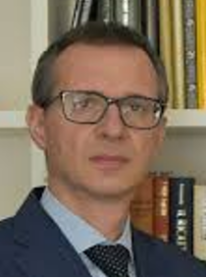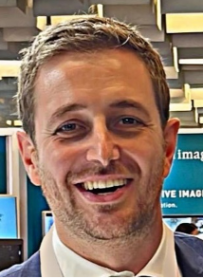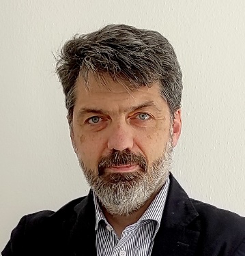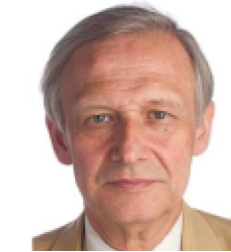WORKSHOP – THE ROLE OF AI IN CLINICAL ENGINEERING
20 September 2024 – morning
CHAIR: Umberto Nocco, AIIC
The role of innovation in medical technologies
Ing Umberto Nocco, Chair of AIIC (Associazione Italiana Ingegneri Clinici)
Artificial Intelligence in biomedical technologies: the role of the Clinical Engineering Service
Ing Serena Vecchi, Ing. Ferruccio Panzica, IRCCS Neurological Institute C. Besta of Milan
Artificial Intelligence supporting the Clinical Engineer: automated planning of the equipment maintenance and/or replacement in the hospital
Ing. Silvio Cravero, ASST Fatebenefratelli – Sacco
Medical Devices with Artificial Intelligence between MDR and AI-Act
Ing. Stefano Bergamasco, Medtech Projects e Direttore Centro Studi AIIC
Ethical Implications of AI in Biomedical Health Technologies
Sergio Cerutti, Emeritus Professor, Department of Electronics, Information and Bioengineering, Politecnico di Milano
 Anna M. Bianchi is Full Professor at the Department of Electronics, Information and Bioengineering (DEIB) at Politecnico in Milano. Her didactic activity is in the field of Biomedical Signal Processing and Medical Informatics. She is scientific responsible of the E-Health Lab at DEIB and is part of the B3 Lab (Biodata, Biosignal, Bioimage Lab). Her main research activities are in the development of methods for multichannel and multisource data integration; use of ML and AI for prediction and classification; decision support systems; monitoring and wearable applications. Main applications in the field of neuroscience, and cardiology. She is responsible at Politecnico for the MS study track in Clinical Engineering and collaborates with the main hospitals in Lombardy for the students’ internships in Clinical Engineering.
Anna M. Bianchi is Full Professor at the Department of Electronics, Information and Bioengineering (DEIB) at Politecnico in Milano. Her didactic activity is in the field of Biomedical Signal Processing and Medical Informatics. She is scientific responsible of the E-Health Lab at DEIB and is part of the B3 Lab (Biodata, Biosignal, Bioimage Lab). Her main research activities are in the development of methods for multichannel and multisource data integration; use of ML and AI for prediction and classification; decision support systems; monitoring and wearable applications. Main applications in the field of neuroscience, and cardiology. She is responsible at Politecnico for the MS study track in Clinical Engineering and collaborates with the main hospitals in Lombardy for the students’ internships in Clinical Engineering.
She is senior Member IEEE Engineering in Medicine and Biology Society, and since 2024 is elected chair of the EMB – Engineering in Medicine and Biology Chapter of the IEEE Italy Section; is member of the IEEE-EMBS Technical Committee on Cardiopulmonary Systems, and of the IEEE-EMBS Technical Committee on Neuroengineering. She is Founder member of GNB (National Group og Bioengineering) and Founder member of SIBIM (Società Scientifica Italiana di Informatica BioMedica); she is Fellow member of EAMBES (European Alliance for Medical and Biological Engineering and Science. She is author of more than 150 scientific papers in the field of Biomedical Engineering (h_index 39).
 Umberto NOCCO, graduated in Mechanical Engineering with a Biomedical specializa-tion in 1999 at the Polytechnic of Milan, began his career in the R&D sector of one of the main Italian biomedical companies. From February 2002 to April 2022 he held the posi-tion of Director of the Clinical Engineering Service of the ASST Sette Laghi of Varese. In the same period he also held the pro tempore role of Director of the S.C. Supplies and the S.C. Asset Technical. Since April 2022 he has been Director of the S.C. Clinical En-gineering of the ASST Gran-de Niguarda Metropolitan Hospital in Milan.
Umberto NOCCO, graduated in Mechanical Engineering with a Biomedical specializa-tion in 1999 at the Polytechnic of Milan, began his career in the R&D sector of one of the main Italian biomedical companies. From February 2002 to April 2022 he held the posi-tion of Director of the Clinical Engineering Service of the ASST Sette Laghi of Varese. In the same period he also held the pro tempore role of Director of the S.C. Supplies and the S.C. Asset Technical. Since April 2022 he has been Director of the S.C. Clinical En-gineering of the ASST Gran-de Niguarda Metropolitan Hospital in Milan.
Collaborates with the Polytechnic of Milan and the University of Trieste for 1st and 2nd level courses and Masters on topics such as Clinical Engineering, healthcare organisa-tion, HTA and HRM. He has been a teacher in numerous courses and seminars orga-nized by universities, institutions and training institutes and has published some works in national and international journals.
 Serena Vecchi is a Professional Technical Collaborator for the Clinical Engineering Ser-vice, Fondazione IRCCS Istituto Neurologico C. Besta. She received the 3 – years bache-lor and the 2 – years master (MSc) degree (Laurea) in Biomedical Engineering. Since 2005 she has been working at the Istituto Neurologico Carlo Besta in Milan, Italy.
Serena Vecchi is a Professional Technical Collaborator for the Clinical Engineering Ser-vice, Fondazione IRCCS Istituto Neurologico C. Besta. She received the 3 – years bache-lor and the 2 – years master (MSc) degree (Laurea) in Biomedical Engineering. Since 2005 she has been working at the Istituto Neurologico Carlo Besta in Milan, Italy.
Her Main Activities is mainly dedicated to: Management of technologies and equipment in the clinical and research fields with the objective of guaranteeing their safe, efficient, appropriate and advantageous use from an economic point of view and of guaranteeing the continuity of healthcare services relating to the use of technologies; Purchase plan-ning and evaluation also with the Health Technology Assessment (HTA) methodologies, in particular for the introduction of innovative, complex or non-fungible technologies; Support to the Administrative Department for the procurement of biomedical technolo-gies, mainly to the definition of the technical characteristics and criteria for evaluation of the equiment; Supervisor for students in Biomedical Engineering from the Politecnico of Milan.
 Ferruccio Panzica is Responsible for Clinical Engineering Service, Fondazione IRCCS Istituto Neurologico “C. Besta since 2016. He received the Laurea Degree in Electronic Engineering (specialization in Systems – Bioengineering) -. Five years University curricu-lum, from the Polytechnic University, (Politecnico di Milano), Milan, Italy, in 1984. Since 1986 He has been working at Istituto Neurologico Carlo Besta in Milan, Italy. In the peri-od 2002-2010 he was the Head of bioengineering unit at the operative unit of Neuro-physiology and diagnostic epileptology, and since 2012-2019 Head of Biomedical Engineering unit and Responsible for Laboratory of Magnetoencephalography, He is author of more than 110 papers published on peer reviewed international journals (h-index = 29, Web of Sciences), collaborated in several EU and Italian research projects in the fields of neurophysiology and biomedical engineering, and he is Reviewer of in-ternational journals on Engineering and Neurophysiology and scientific projects.
Ferruccio Panzica is Responsible for Clinical Engineering Service, Fondazione IRCCS Istituto Neurologico “C. Besta since 2016. He received the Laurea Degree in Electronic Engineering (specialization in Systems – Bioengineering) -. Five years University curricu-lum, from the Polytechnic University, (Politecnico di Milano), Milan, Italy, in 1984. Since 1986 He has been working at Istituto Neurologico Carlo Besta in Milan, Italy. In the peri-od 2002-2010 he was the Head of bioengineering unit at the operative unit of Neuro-physiology and diagnostic epileptology, and since 2012-2019 Head of Biomedical Engineering unit and Responsible for Laboratory of Magnetoencephalography, He is author of more than 110 papers published on peer reviewed international journals (h-index = 29, Web of Sciences), collaborated in several EU and Italian research projects in the fields of neurophysiology and biomedical engineering, and he is Reviewer of in-ternational journals on Engineering and Neurophysiology and scientific projects.
He is Professor on contract in advanced EEG techniques University of Milano Faculty of Medicine and Surgery – Degree of Neurophysiopathology techniques and is Supervisor of PhD students, and students in Biomedical Engineering at Politecnico of Milan.
His Main Activities and areas of research include: development and implementation of advanced methods for the analysis of EEG and MEG activities; study of the cortical con-nectivity network based on scalp or intracranial EEG and MEG recording by means of multivariate techniques and graph theory; study of the relationships between cortical ac-tivity and muscular activity in patients with movement disorders; medical devices man-agement and strategic planning process; Health Technology assessment.
 Silvio CRAVERO, who graduated in Biomedical Engineering with a focus on Clinical Engineering in 2011 from the Polytechnic University of Milan, began his career as a clini-cal engineer at the San Matteo Hospital in Pavia, then from 2012 he served as clinical engineer at the Sacco Hospital in Milan. Since 2019, he has been a clinical engineer manager at the clinical engineering facility of ASST Fatebenefratelli Sacco and is current-ly in charge of the biomedical equipment maintenance management facility. He collaborates with the Politecnico di Milano and the University of Pavia and the Uni-versity of Milan for I and II level courses and Master’s degrees on topics such as Clinical Engineering, healthcare organization, HTA and HRM. He has been a lecturer in courses and seminars organized by universities, institutions and training institutes and has pub-lished some papers in national and international journals. He is currently the company contact person for the Biomedical Technology Assessment Group-HTA at ASST Fate-benefratelli Sacco.
Silvio CRAVERO, who graduated in Biomedical Engineering with a focus on Clinical Engineering in 2011 from the Polytechnic University of Milan, began his career as a clini-cal engineer at the San Matteo Hospital in Pavia, then from 2012 he served as clinical engineer at the Sacco Hospital in Milan. Since 2019, he has been a clinical engineer manager at the clinical engineering facility of ASST Fatebenefratelli Sacco and is current-ly in charge of the biomedical equipment maintenance management facility. He collaborates with the Politecnico di Milano and the University of Pavia and the Uni-versity of Milan for I and II level courses and Master’s degrees on topics such as Clinical Engineering, healthcare organization, HTA and HRM. He has been a lecturer in courses and seminars organized by universities, institutions and training institutes and has pub-lished some papers in national and international journals. He is currently the company contact person for the Biomedical Technology Assessment Group-HTA at ASST Fate-benefratelli Sacco.
 Stefano Bergamasco, clinical engineer with over 20 years of experience in the field, former vice-president of the Italian Association of Clinical Engineers, currently Director of the AIIC Study Centre. Thanks to the many years of experience achieved in companies in the sector in Italy and abroad, in 2016 he started his own independent professional ac-tivity and currently deals with the regulation of medical devices in support of public and private companies and bodies through MedTech Projects Srl of which he is founding member. Lecturer in the Regulatory Affairs course in the Clinical Engineering degree course at the University of Trieste, he is a speaker for courses and workshops in the sec-tor as well as the author of several publications. Member of the Founders Council of the Global Clinical Engineering Alliance, he is very active in international clinical engineer-ing networks and has worked as a consultant at the World Health Organization.
Stefano Bergamasco, clinical engineer with over 20 years of experience in the field, former vice-president of the Italian Association of Clinical Engineers, currently Director of the AIIC Study Centre. Thanks to the many years of experience achieved in companies in the sector in Italy and abroad, in 2016 he started his own independent professional ac-tivity and currently deals with the regulation of medical devices in support of public and private companies and bodies through MedTech Projects Srl of which he is founding member. Lecturer in the Regulatory Affairs course in the Clinical Engineering degree course at the University of Trieste, he is a speaker for courses and workshops in the sec-tor as well as the author of several publications. Member of the Founders Council of the Global Clinical Engineering Alliance, he is very active in international clinical engineer-ing networks and has worked as a consultant at the World Health Organization.
 Sergio Cerutti is actually Emeritus Professor at the Politecnico in Milano where he carries out his research and didactical activities in the area of Advanced Biomedical Signals Analysis at the Department of Electronics, Information and Bioengineering (DEIB). His research activity is mainly dedicated to various aspects of biomedical signal, data processing and modelling related to the field of neurosciences as well as in cardiovascular and autonomic nervous system applications. More recently, he dedicated himself also to Biomedical Imaging, Fusion of Biosignals with Medical Images and Bioinformatics, i.e. the applications of modelling techniques and data processing to the strings of information contained in the DNA, RNA and in proteomics data as well. His characteristic vision of scientific research is finding out how it is possible to enhance information from data and biomarkers obtained from Biosignals, Bioimages and Bioinformatics, by using algorithms typical of modern information processing.
Sergio Cerutti is actually Emeritus Professor at the Politecnico in Milano where he carries out his research and didactical activities in the area of Advanced Biomedical Signals Analysis at the Department of Electronics, Information and Bioengineering (DEIB). His research activity is mainly dedicated to various aspects of biomedical signal, data processing and modelling related to the field of neurosciences as well as in cardiovascular and autonomic nervous system applications. More recently, he dedicated himself also to Biomedical Imaging, Fusion of Biosignals with Medical Images and Bioinformatics, i.e. the applications of modelling techniques and data processing to the strings of information contained in the DNA, RNA and in proteomics data as well. His characteristic vision of scientific research is finding out how it is possible to enhance information from data and biomarkers obtained from Biosignals, Bioimages and Bioinformatics, by using algorithms typical of modern information processing.
He is the Author of more than 650 indexed international scientific contributions (about 350 on indexed scientific journals, according to ISI). His h-Index is 79 (Google Scholar). His most cited paper is the Task Force on HRV, 1996, one of the most cited papers on Circulation, over 19,500 overall citations:
He is in the Editorial Board of various journals in Biomedical Engineering area.
He is a Member of the Group of the Best Italian Scientists (with h-Index ≥ 30), scoring a h-index of 79, at 34th position inside “Engineering” topic at national level (2024) and with a documented number of citations of more than 55,000.

